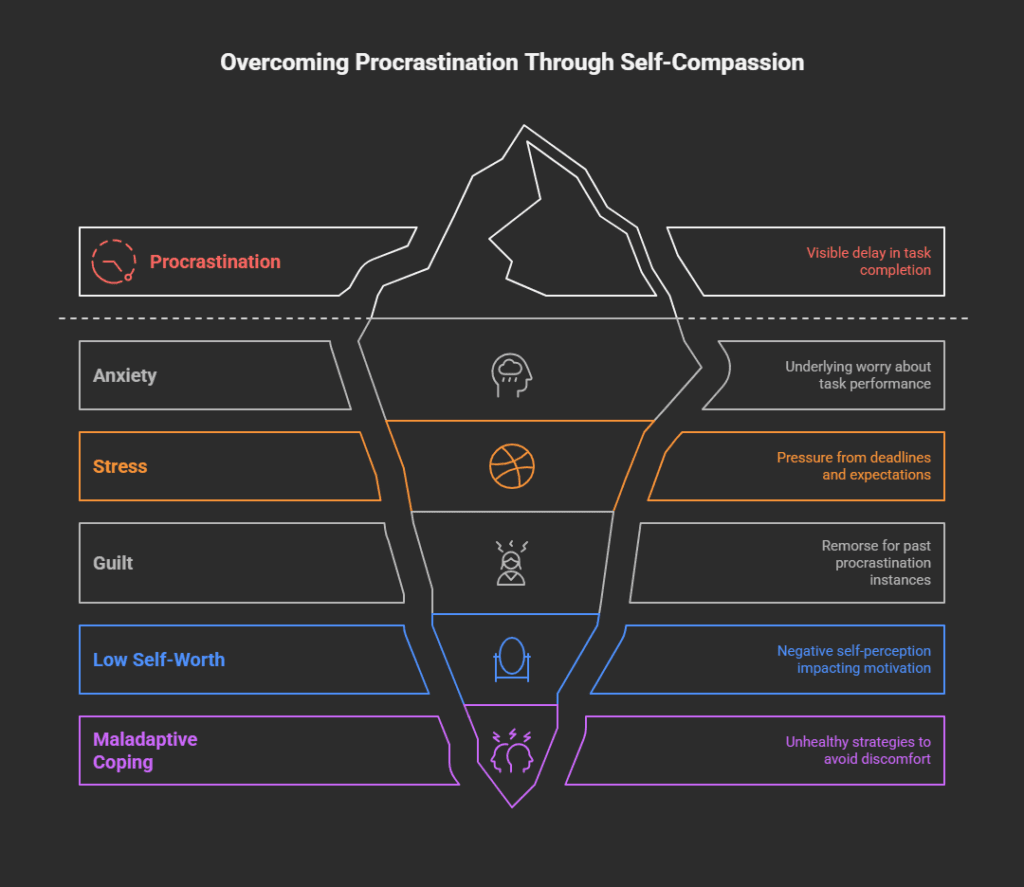Let’s be honest for a second. That to-do list? It’s probably staring at you from across the room. Giving you the side-eye. And you? You’re a master of avoidance. A connoisseur of “I’ll do it later.” We’ve all been there. Shoving that dreaded task to the bottom of the pile, promising ourselves we’ll get to it… eventually.
But here’s the kicker. What if that’s not just a harmless habit? What if it’s something more… insidious?
Procrastination. It’s a word we toss around casually, almost like a badge of honor in our hustle-and-grind culture. “Oh, I’m such a procrastinator!” we say with a laugh. But behind that chuckle often lies a tangled mess of anxiety, stress, and a whole lot of guilt. It’s a silent saboteur, quietly chipping away at our mental health.
Funny thing is, we tend to think of procrastination as a time-management problem. A simple lack of discipline. But what if I told you it’s got very little to do with that? And almost everything to do with our emotions.
This isn’t just about missing deadlines. It’s about the silent war we wage within ourselves. The constant hum of anxiety in the background. The slow erosion of our self-esteem. It’s a vicious cycle, and one that’s incredibly easy to get trapped in. But here’s the good news: understanding that cycle is the first step to breaking free. So, grab a cup of something comforting, and let’s spill the beans on what’s really going on when we put things off.
The Great Deception: Why We Procrastinate in the First Place
Think about the last time you procrastinated. Think about it. What was the task? Was it something you were dreading? Something you were afraid of failing at? Chances are, it wasn’t just boring. It was… emotionally charged.
And that’s the crux of the matter. Procrastination, at its core, is an emotional regulation strategy. A (terrible, if I’m honest) way of coping with difficult feelings. When we’re faced with a task that makes us feel anxious, insecure, or just plain overwhelmed, our brain does a funny thing. It goes into self-preservation mode. “Danger, Will Robinson! Unpleasant emotions ahead!” And what’s the easiest way to avoid those unpleasant emotions? You guessed it. Avoid the task.
It’s a short-term fix, of course. A little hit of relief. Phew, dodged that bullet. But the problem is, the task doesn’t just magically disappear. It’s still there. Looming. And now, it’s brought some friends to the party: guilt, shame, and a whole lot more anxiety.
It’s like this: imagine your to-do list is a haunted house. You know you have to go in. You know you have to face the ghosts (or, you know, that quarterly report). But just the thought of it sends a shiver down your spine. So you decide to walk around the block a few times instead. You check your phone. You alphabetize your spice rack. Anything to avoid opening that creaky front door.
But the longer you wait, the darker it gets. The scarier the house seems. And the more you beat yourself up for not just getting it over with. Sound familiar?
Anxiety’s Playground: The Procrastinator’s Constant Companion
Let’s talk about anxiety. For many of us, it’s the fuel that feeds the procrastination fire. The two are practically best friends. It’s a real chicken-or-the-egg situation, if you think about it. Does anxiety cause procrastination, or does procrastination cause anxiety? The answer, frustratingly, is yes.
It’s a bidirectional nightmare. A two-way street of stress.
Here’s how it often plays out. You have a big project on the horizon. A presentation at work. A final exam. And a little voice in your head starts whispering. What if you mess up? What if you’re not good enough? What if everyone finds out you’re a fraud?
That’s anxiety talking. And it’s pretty convincing. So, to quiet that voice, you do… nothing. You distract yourself with a Netflix binge. You suddenly decide your entire apartment needs to be deep-cleaned. Anything to avoid the task that’s making you feel so vulnerable.
But the relief is fleeting, isn’t it? Because now, you have less time. The deadline is creeping closer. And that little whisper of anxiety has turned into a full-blown scream. The pressure mounts. The stakes get higher. And the task itself starts to feel monumental. Insurmountable.
This is what we call the anxiety from the procrastination loop. It’s a self-fulfilling prophecy. You’re anxious about not doing a good job, so you put it off. And by putting it off, you almost guarantee that you won’t do your best work. You’ll be rushed. You’ll be stressed. And the final product will likely be… subpar. Which, of course, just reinforces that initial fear: See? I knew I wasn’t good enough.
It’s a brutal cycle. And one that can have a serious impact on your overall mental well-being. It’s not just about the stress of the task itself anymore. It’s about the constant, low-grade anxiety that starts to permeate every aspect of your life. The feeling of being perpetually behind. The dread that hangs over your weekends. It’s exhausting.
The Weight of “Later”: How Stress Crushes Your Willpower
Stress and procrastination. Another match made in hell. When we’re stressed, our brains are not at their best. Our prefrontal cortex, the part of our brain responsible for things like planning, decision-making, and impulse control, basically goes offline. It’s hijacked by our more primitive, emotional brain. The one that’s screaming, “I need to feel better, NOW!”
And what feels better than tackling that massive, stress-inducing project? Almost anything, if we’re being honest. Scrolling through social media. Eating a pint of ice cream. Taking a nap. These things provide an immediate (albeit temporary) escape from the stress.
The irony, of course, is that the stress caused by delay is often far worse than the stress of just doing the damn thing. It’s a different kind of stress. A more corrosive kind. It’s the stress of knowing you’re actively making your own life harder. The stress of disappointing yourself. Again.
And let’s not forget the physical toll. Chronic stress, the kind that comes from constantly putting things off, can wreak havoc on our bodies. We’re talking headaches, digestive issues, insomnia… the whole nine yards. It’s a physical manifestation of our mental turmoil. Our bodies are literally telling us that something is wrong. This pattern of avoidance is not sustainable.
Think about it. When you finally, at the eleventh hour, sit down to do the thing you’ve been dreading for weeks, how do you feel? Probably not calm and focused. You’re likely a frantic, caffeine-fueled mess. Your heart is racing. Your thoughts are scattered. This isn’t the optimal state for producing high-quality work, is it? It’s a recipe for burnout.
The Guilt Trip: A One-Way Ticket to Shameville
Ah, guilt. The unwelcome houseguest that overstays its welcome. If anxiety is the engine of procrastination, guilt is the toxic exhaust it leaves behind. The procrastination guilt is a heavy, suffocating blanket. It’s the voice that whispers, You should have started earlier. You’re so lazy. What’s wrong with you?
This is where things can get really dark. Because guilt, when left to fester, often morphs into its more destructive cousin: shame.
What’s the difference? Well, guilt is about what you’ve done (or, in this case, what you haven’t done). “I feel bad that I didn’t finish that report.” Shame, on the other hand, is about who you are. “I’m a bad person because I didn’t finish that report. I’m a failure. I’m lazy.”
See the difference? It’s a subtle but crucial shift. Guilt can be a motivator. It can prompt us to change our behavior. Shame, however, is paralyzing. It makes us want to hide. To retreat further into ourselves. It tells us that the problem isn’t our actions; it’s our very essence.
And when we’re in the grip of shame, what are we likely to do? You guessed it. Procrastinate even more. It’s a desperate attempt to avoid feeling that deep, painful sense of inadequacy. If we don’t try, we can’t fail. And if we can’t fail, we can (theoretically) protect ourselves from feeling like a failure.
It’s a deeply flawed logic, of course. But in the moment, it feels like the only option. The cycle continues, and with each turn, our self-esteem takes another hit. We start to believe the negative stories we tell ourselves. We start to see ourselves as inherently flawed. Unreliable. Incapable.
The Self-Esteem Nosedive: How Procrastination Erodes Your Sense of Self
Our self-esteem is a fragile thing. It’s built on a foundation of trust in ourselves. A belief in our abilities. And every time we procrastinate, we chip away at that foundation. We break a promise to ourselves. We prove, once again, that we can’t be trusted to follow through.
Think of it as a relationship. If you had a friend who constantly bailed on you, who never kept their word, how long would you continue to trust them? How long would you continue to value that friendship? Not very long, I’d imagine.
Well, the same goes for the relationship we have with ourselves. When we repeatedly let ourselves down, our self-worth plummets. We start to see ourselves through a lens of failure and disappointment. The internal monologue becomes a relentless barrage of self-criticism.
And here’s the insidious part. Low self-esteem can make us more likely to procrastinate. When we don’t believe in our ability to succeed, we’re less motivated to even start. It’s a self-perpetuating loop of self-sabotage. Why bother trying? I’m just going to mess it up anyway.
This is where perfectionism often enters the chat. Believe it or not, many procrastinators are perfectionists in disguise. They have such impossibly high standards for themselves that the thought of not meeting them is terrifying. So, rather than risk producing something less than perfect, they do nothing at all.
It’s a defense mechanism. A way of protecting their fragile self-esteem. If they don’t submit the report, no one can criticize it. If they don’t take the exam, they can’t get a bad grade. It’s a twisted logic, but one that makes a strange kind of sense when you’re terrified of failure.
The problem, of course, is that this avoidance comes at a huge cost. The cost of our growth. Our potential. Our happiness. We stay stuck, trapped by our fear, while our self-esteem continues to wither on the vine.
Breaking the Chains: A Kinder, Gentler Approach to Getting Things Done

So, we’ve painted a pretty bleak picture here. A doom loop of anxiety, stress, guilt, and plummeting self-worth. You might be feeling a little… called out right now. And that’s okay. The first step to fixing a problem is admitting you have one, right?
The good news is, you are not broken. You are not inherently lazy. You are a human being who has developed a maladaptive coping mechanism. And the even better news? You can develop new ones.
But here’s the thing. The answer isn’t to just “try harder.” It’s not about brute force or white-knuckling your way through your to-do list. That approach is like trying to put out a fire with gasoline. It just adds more pressure, more anxiety, and more opportunities for self-criticism.
The real solution lies in a radical act of self-compassion.
It’s about understanding why you’re procrastinating and then addressing those underlying emotions with kindness, not criticism. It’s about learning to forgive yourself for not being perfect. It’s about shifting your focus from the outcome to the process.
Here are a few things to try. And I mean try. Give them a fair shot.
1. Practice Self-Compassion. This is the big one. The next time you catch yourself procrastinating, instead of beating yourself up, try a different approach. Acknowledge the feeling. “Wow, I’m feeling really anxious about this task.” Validate it. “It’s okay to feel anxious. This is a big project.” And then offer yourself some kindness. “What’s one tiny, non-scary thing I can do to get started?”
2. Break It Down. That monumental, terrifying task? It’s probably not one task. It’s likely a whole bunch of smaller tasks rolled into one big, scary ball of dread. So, break it down. And I mean, really break it down. Into ridiculously small, almost laughable steps. “Open the document.” “Write one sentence.” “Find one research article.” Each tiny step you complete is a small victory. A little deposit in your self-esteem bank.
3. The Two-Minute Rule. This is a game-changer. Whatever the task is, commit to doing it for just two minutes. That’s it. Anyone can do anything for two minutes, right? The funny thing is, once you start, you’ll often find that it’s not as bad as you thought. And you might just keep going. The hardest part is almost always just getting started.
4. Forgive Your Past Self. So, you procrastinated. You waited until the last minute. You pulled an all-nighter. It happened. Beating yourself up about it now isn’t going to change anything. In fact, it’s just going to make you feel worse and more likely to do it again next time. So, forgive yourself. Acknowledge that you did the best you could with the emotional resources you had at the time. And then, make a plan to do things a little differently next time.
5. Focus on Feelings, Not Just a Fix. Before you dive into a task you’re dreading, take a minute to check in with yourself. What are you feeling? Anxiety? Fear? Boredom? Acknowledge the emotion without judgment. Sometimes, just naming the feeling can take away some of its power. Then, ask yourself, “What do I need to feel a little bit better right now?” Maybe it’s putting on some music. Maybe it’s making a cup of tea. Maybe it’s doing a few stretches. Tend to your emotional state first, and the task will feel much less daunting.
6. Celebrate the Small Wins. Did you open the document? Awesome. Celebrate it. Did you write one paragraph? High-five yourself. Seriously. We’re so focused on the finish line that we forget to acknowledge the progress we make along the way. Rewiring your brain to associate tasks with positive feelings, even small ones, can make a huge difference.
Look, breaking the cycle of procrastination isn’t an overnight fix. It’s a practice. It’s a process of unlearning old habits and building new, healthier ones. There will be days when you fall back into old patterns. And that’s okay. The goal isn’t perfection. The goal is progress.
It’s about trading self-criticism for self-compassion. It’s about understanding that you’re not a machine. You’re a human being with a complex inner world. And it’s about finally realizing






















